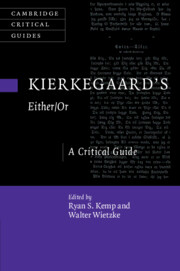Book contents
- Kierkegaard’s Either/Or
- Cambridge Critical Guides
- Kierkegaard’s Either/Or
- Copyright page
- Contents
- Contributors
- Acknowledgments
- Abbreviations
- Introduction
- Chapter 1 Existential Melancholia
- Chapter 2 Don Giovanni and the Musical-Erotic
- Chapter 3 For What May the Aesthete Hope?
- Chapter 4 Companions in Guilt
- Chapter 5 A’s Religion of Boredom
- Chapter 6 The Artist Is Not Present
- Chapter 7 Failed Temporalities in Either/Or
- Chapter 8 Love, Marriage, and Delusion in Either/Or
- Chapter 9 The Philosophy of Science in Either/Or
- Chapter 10 The Despair of Judge William
- Chapter 11 The Problem of Evil in Either/Or
- Chapter 12 Illusions of Ethical Independence
- References
- Index
- Cambridge Critical Guides
Chapter 10 - The Despair of Judge William
Published online by Cambridge University Press: 16 November 2023
- Kierkegaard’s Either/Or
- Cambridge Critical Guides
- Kierkegaard’s Either/Or
- Copyright page
- Contents
- Contributors
- Acknowledgments
- Abbreviations
- Introduction
- Chapter 1 Existential Melancholia
- Chapter 2 Don Giovanni and the Musical-Erotic
- Chapter 3 For What May the Aesthete Hope?
- Chapter 4 Companions in Guilt
- Chapter 5 A’s Religion of Boredom
- Chapter 6 The Artist Is Not Present
- Chapter 7 Failed Temporalities in Either/Or
- Chapter 8 Love, Marriage, and Delusion in Either/Or
- Chapter 9 The Philosophy of Science in Either/Or
- Chapter 10 The Despair of Judge William
- Chapter 11 The Problem of Evil in Either/Or
- Chapter 12 Illusions of Ethical Independence
- References
- Index
- Cambridge Critical Guides
Summary
Kierkegaard’s thesis that lacking faith is necessarily a state of despair leads to the conclusion that Either/Or’s fictional character Judge William, who belongs to the “ethical” rather than the “religious” stage of life, is, despite the many virtues of his position, in a state of despair. What does his despair amount to, then? Relying on Kierkegaard’s analysis of despair in The Sickness unto Death, I claim that the failure in the Judge’s view of life is rooted in his misguided understanding of what it is to be a “self.” By taking himself to have ultimate control over the way he is (in a manner akin to what Sartre’s means by “radical freedom”), the Judge fails to acknowledge that he possesses what I term an individual essence, bestowed upon him by God in a state of potential. This chapter explains the conception of individual essence and demonstrates how it applies to the Judge’s despair.
- Type
- Chapter
- Information
- Kierkegaard's Either/OrA Critical Guide, pp. 171 - 187Publisher: Cambridge University PressPrint publication year: 2023

